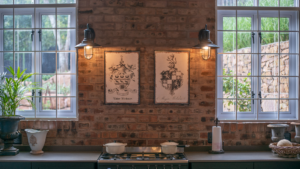Home security is a primary concern for everyone, regardless of whether you own or rent a property. However, when you’re a renter, you may face unique challenges when it comes to securing your home. The good news is that there are plenty of effective solutions available to address these concerns.
It’s sad, but as a renter, you may not have the same amount of home security as a homeowner. Many people are concerned, if not anxious, about their safety at home as a result of this.
Even if your landlord or property laws prohibit you from using standard home security tactics, you still have a lot of tools at your disposal—many of which you may be unaware of.
Below, we will explore five common home security concerns for renters and provide practical solutions to help you protect your rented space.
1. Limited Control Over Entry Points
The little control tenants have over entry points to their properties is one of the most critical issues they encounter. Landlords often oversee and maintain external doors, making it difficult to install high-security locks or make significant property changes.
Solution:
- Install Door Reinforcement Hardware: Even if you can’t replace the door, you can strengthen it with hardware such as door jammers, security bars, or strike plates. These low-cost, non-permanent alternatives can significantly improve the security of your front entrance.
- Install a Smart Lock: Many smart locks are intended to fit over existing locks, so no drilling or permanent adjustments to the door are required. They enable remote access control, allowing you to grant guests and service providers temporary access while preserving security.
- Request Permission: Talk to your landlord about security concerns. They may be willing to let you change the locks or install additional security measures if you bear the costs and agree to return the property to its original state when you leave.
2. Lack of Outdoor Lighting
Inadequate exterior lighting might provide hiding places for potential intruders, making your property less secure. However, as a renter, you may not influence the external lighting of the home.
Solution:
- Invest in Outdoor Lighting: Install motion-activated outdoor lights around entryways, pathways, and other susceptible areas. These lights are simple to install and might discourage burglars by drawing attention to their existence.
- Solar-Powered Lights: If you don’t want to deal with wiring or battery replacement, go with solar-powered lights. During the day, they charge and at night, they brighten your property.
- Speak with Your Landlord: Talk to your landlord about your worries and ask if they would consider adding or increasing exterior lighting. It is in their best interests to keep the building safe for all tenants.
3. Inadequate Window Security
Windows are another possible point of failure for tenants. Standard window locks may not be adequate, and some rental houses may have obsolete or badly maintained windows.
Solution:
- Window locks or pin locks should be purchased to prevent windows from being opened wide enough for someone to enter. These are simple to set up and can add an extra degree of security.
- You can have a discussion with your landlord about installing physical security barriers that will help keep you safe. Additionally, point out how having physical security gates or burglar bars can help increase the value of their property – a win-win situation for both parties. Trellidor has a robust & attractive range of high-quality security barriers you can consider and both decide on with your landlord.
4. Limited Control Over Security Systems
Installing a complete security system can be difficult for tenants since it frequently requires drilling holes and wiring, which your lease agreement may prohibit.
Solution:
- Wireless Security Systems: Select wireless security systems that do not necessitate digging or complex installation. Many current security systems are simple to install and if you move, they can be transported to your new home.
- DIY Security Cameras: There are numerous DIY security camera systems available that may be installed without causing any damage to walls or doors. These cameras provide remote monitoring and can be carefully placed to cover vulnerable locations.
- Negotiate with Your Landlord: Talk to your landlord about installing a security system. If required, offer to cover the installation fees and remove the system when you move out.
5. Inadequate or Nonexistent Alarm Systems
Traditional alarm systems with professional monitoring can be expensive meaning that not all rental homes have them.
Solution:
- DIY Alarm Systems: Consider implementing a self-monitoring or optional professional monitoring DIY alarm system. These systems frequently feature door and window sensors, motion detectors, and sirens.
- Window and Door Alarms: Use standalone window and door alarms to secure entry points at a low cost. When triggered, these alarms make a loud noise, alerting you and maybe scaring off intruders.
- Smart Home Security: Purchase a smart home security system that connects to your smartphone. You may get alerts and control your security equipment remotely, giving you more peace of mind.
Conclusion
Even if their lease agreements impose limits, renters can use numerous methods to improve their home security. Renters can have peace of mind and protect their loved ones and valuables by investing in non-permanent security measures, raising issues with landlords, and taking proactive efforts to secure their properties. Remember that home security is a shared duty, and securing your rental property is an investment in your safety and well-being.



